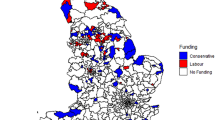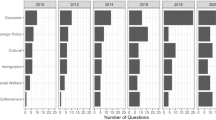Conclusion
This paper represents an initial effort to build a model of the demand revelation and supply response mechanisms implicit in the effect of citizen lobbying efforts on the decisions of municipal officials. A utilitarian social welfare function was used as a benchmark to judge the results of this lobbying model.
The empirical evidence presented indicated that both elected and appointed city officials in Ann Arbor respond to citizen lobbying opposing or supporting particular zoning amendment proposals. The normative evaluation of this response produced mixed results.
Much of the public choice/public finance literature has focused on a search for a new demand revealing mechanism that would circumvent the free rider problem. This approach was criticized by Bohm (1979) for not producing politically acceptable demand revealing mechanisms; recent research indicates some uncertainty regarding the magnitude of the free rider problem. An alternative approach taken by this paper is to examine the workings and efficiency properties of previously ignored and already existing mechanisms for revelation of demand.
Similar content being viewed by others
References
Austen-Smith, D. (1980). Individual contribution to public goods. Economic Letters 5: 359–361.
Bohm, P. (1979). Estimating willingness to pay: Why and how? Scandinavian Journal of Economics 81: 142–153.
Bowen, H.R. (1943). The interpretation of voting in the allocation of economic resources. Quarterly Journal of Economics 58: 27–48.
Downs, A. (1957). An economic theory of democracy. New York: Harper and Row.
Glendening, P.N., and Reeves, M.M. (1979). Federal actions affecting local government: Much activity, limited impact. The municipal year book 1979, 27–36. Washington, D.C.: International City Management Association.
Isaac, R.M., McCue, K.F., and Plott, C.R. (1982). Public goods provision in an experimental environment. California Institute of Technology Social Science Working Paper 428, June.
Kenyon, D.A. (1980). Zoning change decisions in Ann Arbor, Michigan: Theory and empirical evidence. Unpublished Ph.D. dissertation, The University of Michigan, Ann Arbor, Michigan.
McFadden, D. (1975). The revealed preferences of a public bureaucracy: Theory. Bell Journal of Economics 6: 401–416.
Prewitt, K. (1970). Political ambitions, volunteerism and electoral accountability. American Political Science Review 64: 5–17.
Rehfuss, J. (1979). Citizen participation in urban fiscal decisions. The municipal year book 1979, 84–97, Washington, D.C.: International City Management Association.
Schneider, F., and Pommerehne, W.W. (1981). Free riding and collective action: An experiment in public microeconomics. Quarterly Journal of Economics 96: 689–704.
Sproule-Jones, M. (1974). A description and explanation of citizen participation in a Canadian municipality. Public Choice 17: 73–83.
Tideman, T.N. (1969). Three approaches to improving land use. Unpublished Ph.D. dissertation, The University of Chicago, Chicago, Illinois.
Tiebout, C. (1956). A pure theory of local expenditure. Journal of Political Economy 64: 416–424.
Author information
Authors and Affiliations
Additional information
Financial support was provided by the Dartmouth College Committee on Research and the Louis H. Haney Fund at Dartmouth College.
Helpful comments on earlier drafts were made by Harvey Brazer, William Dougan, William Fischel and John Menge. I assume responsibility for any errors.
Rights and permissions
About this article
Cite this article
Kenyon, D.A. Preference revelation and supply response in the arena of local government. Public Choice 42, 147–160 (1984). https://doi.org/10.1007/BF00124157
Issue Date:
DOI: https://doi.org/10.1007/BF00124157




